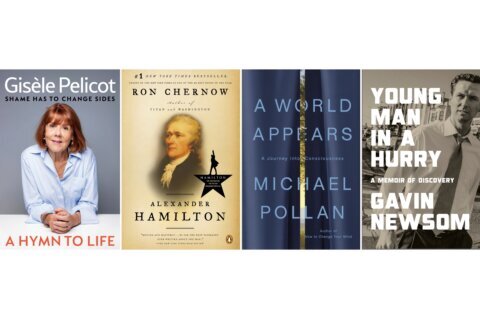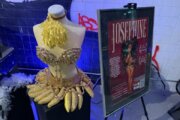WASHINGTON — Before Jimi Hendrix, Janis Joplin, Kurt Cobain and Amy Winehouse became music martyrs for their respective generations, Hank Williams left us eleven No. 1 country hits (three posthumously) when he died in the back seat of his Cadillac en route to a concert on New Year’s Day 1953.
This provides the backdrop for the final scene of the new biopic “I Saw the Light,” as concert goers solemnly sing the title gospel tune upon learning of his untimely death by heart failure — triggered by alcohol, morphine and chloral hydrate to ease the pain of spina bifida — at the young age of 29.
Starring the brilliant Tom Hiddleston as the tragic music genius, the film explores both Hank’s rise to stardom on hits like “I’m So Lonesome I Could Cry,” “Lovesick Blues,” “Hey Good Lookin'” and “Your Cheatin’ Heart” and the damage his drunken womanizing had on wife Audrey (Elizabeth Olsen).
“People say to me that ‘Hey Good Lookin’ is like ‘Happy Birthday.’ It’s one of those things, you can start singing, ‘Hey Good Lookin’ anywhere in the world and people will join in, and they often don’t know it’s Hank Williams. So that’s how I knew Hank. But until I read the script, I had no knowledge of his life, his circumstances, his marriage … all of that stuff was new to me,” Hiddleston tells WTOP.
While the optimistic title hopes Hank “saw the light,” the tone is consistently dark, telling a dramatic tale of an often immoral anti-hero. It’s a conscious stylistic choice by writer/director Marc Abraham (producer of Norman Jewison’s “The Hurricane” and Alfonso Cuaron’s “Children of Men”), who appears just as fascinated by Hank’s inner demons as his music, knowing that both fed each other.
This fascination is understandable. Hank’s hard-living lifestyle has taken on mythical status, thanks to his “Bocephus” son Hank Williams Jr. calling it a “Family Tradition” and David Allan Coe immortalizing the legend with his 1983 hit “The Ride,” telling of a hitchhiker who gets a ride from Hank’s ghost:
“I was thumbin’ from Montgomery, had my guitar on my back, when a stranger stopped beside me in an antique Cadillac. He was dressed like 1950, half-drunk and hollow-eyed, he said, ‘It’s a long walk to Nashville? Would you like a ride, son?'”
Imagine if the film had used this as a framing device, albeit taking the movie in a more supernatural direction than the one chosen by Abraham, who adapts the script from a biography by Colin Escott, George Merritt and William MacEwen. Instead, “I Saw the Light” frames its story within a series of black-and-white rockumentary-style interviews by Hank’s songwriting peer Fred Rose (Bradley Whitford), who does his best Joseph Cotten recounting the rise and fall of Charles Foster Kane.
“I tried not to make it so much that you knew he was speaking in the past or in the future, he was just talking about Hank … What I really wanted to avoid was the idea of Hank or Audrey within the context of the film giving us information about what was taking place, so I kind of cribbed it from Bob Fosse, who used a similar technique … in ‘Lenny’ (1974),” Abraham tells WTOP.
Still, if there were ever a life that lent itself to magical realism, it’s that of Williams. As John Ford said, “When the legend becomes fact, print the legend.” Framing the story within the dreamlike context of “The Ride” — while a riskier approach — might have paid haunting dividends for a nostalgic narrator:
“Then I noticed the stranger was ghost-white pale when he asked me for a light, and I knew there was something strange about this ride.”
While such a peripheral narrator is easier to pull off in literature than cinema — think Nick “Old Sport” Carraway in “The Great Gatsby” (1925) — it would have actually worked for Hiddleston after playing F. Scott Fitzgerald in “Midnight in Paris” (2011). The eyes of T.J. Eckleburg are always watching like country gods staring down from concert billboards as Hank moves from town to town.
“That’s a such a great (analogy). You’re the first person to ever make that comparison … Scott and Zelda were a lot more sophisticated. They were a lot more educated. They had that sort of Princeton sheen and smoothness of that particular time. They had immense style, and their indulgences were more of the Champagne variety as opposed to the whiskey variety,” Hiddleston says.
But there are key similarities, particularly in the marital clashes between Hiddleston and Olsen.
“There would be no F. Scott Fitzgerald without Zelda, and there would be no Hank Williams without Audrey. I think their relationships and their marriage, the intensity of the passion contained in those relationships, is what gave each of those men an engine to create their best work,” Hiddleston says.
As singers, the acting duo is every bit as up to the challenge as Joaquin Phoenix’s Oscar-nominated Johnny Cash and Reese Witherspoon’s Oscar-winning June Carter Cash in “Walk the Line” (2005). In fact, you could argue Williams’ voice is the tougher to master, because it features classic country’s ultimate twang and challenging vocal inflections — especially for a British actor like Hiddleston.
“I recorded ‘Why Don’t You Love Me’ in an hour, and I recorded ‘Lovesick Blues’ in about 10 days. ‘Lovesick Blues’ was my Mount Everest, because Hank’s control over that song is so masterful, and he used to say when he performed it live, ‘This song I’ve played 13 million and one half times.’ He had the luxury and privilege of having practiced it for years and I had about two weeks,” Hiddleston jokes.
To prepare for the role, Hiddleston moved to Nashville and lived as a guest with Rodney Crowell, who served as both the film’s executive music producer and Hiddleston’s “guide through the woods.”
“He himself was a huge Hank Williams fan. He saw Hank Sr. on his own father’s shoulders at the age of two when he was a child. It was one of his earliest memories. He’s been playing music for 40 years, understands Hank’s music, the footprint of Hank’s music on the rest of 20th-century culture, and he was able to piece it out for me and deconstruct it and demystify it,” Hiddleston says of Crowell.
While Hiddleston moved to Nashville to research the role, Abraham grew up in the region.
“I grew up in Louisville, Kentucky, which is up I-65 from Nashville, so I was a country music fan pretty much my whole life … I listened to George Jones and then Merle (Haggard), a big Kris Kristofferson fan and Willie (Nelson). Ultimately though, if you’re listening to those guys and you’re listening to the radio, no DJ is going to play a set without eventually playing a Hank Williams song,” Abraham says.
“I sat down in the front seat and turned on the radio, and them sad, old songs comin’ out of them speakers was solid country gold.”
While some of Hank’s “solid country gold” jams were prerecorded by Hiddleston, he took the acting risk of recording several of them live, including the posthumous classic “Your Cheatin’ Heart.”
“That was one of the ones that Rodney and Marc both insisted I sing live, because the lyrics to ‘Your Cheatin’ Heart’ are so pained and so sad that in order to transmit that, I didn’t want to record it ahead of time. It was actually an acting challenge as much as it was a singing challenge. What I needed to convey was the pain he was in and how that was connected to the song,” Hiddleston says.
As the film shows, Hank’s pain was both physical and emotional, dealing with the heartache of failed relationships and debilitating back pain due to the devastating effects of deformed vertebrae. Such a condition provides the perfect directorial symbolism for Abraham, who foreshadows Hank’s death in that infamous Cadillac by constantly showing him lying in back seat of cars throughout the movie.
“It’s nice that you spotted that,” Hiddleston says, a notion which Abraham humbly downplays, saying, “Hank was in pain. His back was always painful for him. They didn’t discover yet spina bifida until he was much older, so pretty much whenever he had a chance to lie down, he did … It was a conscious effort (as a director), but I think mostly it was about his back hurting. (That) was the truth of it.”
“Then he cried just south of Nashville and he turned that car around, he said, ‘This is where you get off, boy, ’cause I’m going back to Ala-bam.’ As I stepped out of that Cadillac, I said, ‘Mister, many thanks.’ He said, ‘You don’t have to call me Mister, Mister. The whole world called me Hank!'”
While Abraham’s directing delivers visual symbolism, his script has taken some heat from the sharp knives of film critics — some fair, some not. On the one hand, the dialogue is admirably elliptical.
“There’s a lot of information that takes place in movies … and you can do it a lot of different ways. You can have the dialogue have a lot of exposition, which is my least favorite thing in the world … (Instead), they’re in a hospital room and Hank’s talking to his wife Audrey, she asks him a question, and he answers her with a question. It’s very real dialogue. It’s how people talk,” Abraham says.
On the other hand, the character arc feels just as elliptical, jumping from one failed romance to the other and skimming along Hank’s life story like a rock skipping across a pond. By the end, we wish we dove deeper to discover more of Hank’s motives. If we’re going to praise the power performances, consistent tone and clever visual symbolism, we must also admit an intangible emotional distance.
Creating an emotional connection with the audience is no easy task for any screenwriter, let alone in Abraham’s debut feature screenplay. As another ill-fated musician — AC/DC frontman Bon Scott — warned, “It’s a long way to the top if you wanna rock ‘n roll,” echoing Coe’s plea to pay your dues, moan the blues and bend those guitar strings like Hitchcock plucking viewers’ emotional chords:
“He said, ‘Drifter can you make folks cry when you play and sing? Have you paid your dues, can you moan the blues, can you bend them guitar strings? He said boy can you make folks feel what you feel inside? ‘Cause if you’re big-star bound, let me warn you it’s a long, hard ride.”
“Films like ‘All That Jazz’ and ‘Lenny’ and ‘Raging Bull,’ which are movies that don’t really explain why Jake LaMotta is who he is, (they) don’t pick him up as a young boy getting beat up by a bunch of boys on the street so you see he becomes a fighter. I love those kinds of movies,” Abraham says.
Fosse and Scorsese are great north stars for a hungry filmmaker in his second directorial effort. At the very least, Abraham coaches an amazing performance from Hiddleston, a worthy vessel as the Roy Scheider to Fosse’s “All That Jazz” (1979) or Robert DeNiro to Scorsese’s “Raging Bull” (1980).
“I couldn’t have done any of this without Marc. … He has the sophistication and experience to know that people are complex and contradictory and they get in their own way and they mean well, but sometimes they trip up … Marc’s an incredibly wise man,” Hiddleston says.
How does Abraham’s directing style compare to Hiddleston’s past directors?
“Woody Allen doesn’t give you as many takes as Marc … I feel like an instrument in the orchestra … It’s my job to play to the tune of a new conductor … The director has the baton, whether it’s Woody Allen or Guillermo Del Toro or Kenneth Branagh or Steven Spielberg,” Hiddleston says.
Each auteur only further continues to shape Hiddleston as one of the finest actors of this generation, racking up credits that would make anyone envious, from Spielberg’s “War Horse” (2011) to Allen’s “Midnight in Paris” (2011), Del Toro’s “Crimson Peak” (2015) to Joss Whedon’s “The Avengers” (2012). It’s the lattermost that cemented Hiddleston’s pop culture status as super villain Loki.
“I’ll never forget the first time I saw (‘Superman’) … directed by Richard Donner with Christopher Reeve when I was five or six years old. I probably saw it on VHS or on television, and I don’t think I’d ever seen anything greater than that in all my days. They were only five years worth of days (at that age), but as a kid, Christopher Reeve, I’ll never forget it. He was the first real superhero,” he says.
So with “Batman v Superman” currently No. 1 at the box office, what strategy would Hiddleston take to defeat both iconic superheroes in a dream triple-threat match of “Batman v Superman v Loki?”
“I think he’d be amused that the children are playing. He’d sit high up in a tree and watch them throw rocks at each other … You’re giving birth to a whole idea here, which is the idea that the Marvel Universe could somehow cross-pollinate with the DC Universe. Fans’ minds would explode,” he says.
Upon considering it more, Hiddleston thinks Superman would be his biggest obstacle.
“I feel like Superman would present a challenge. But he’s got form with people who wear red capes and fly around. You know, Thor wears a red cape and flies around a lot. I think he’d just be slightly exasperated by their need to go another 15 rounds in the ring. ‘Do we have to do this? I’ve been here before’ … I think he’d just be generally amused and patronizing about the whole thing,”
There’s only one way to solve it: smash a country guitar over both their heads and call it a day.
Listen to the full interview with Tom Hiddleston and Marc Abraham below:








